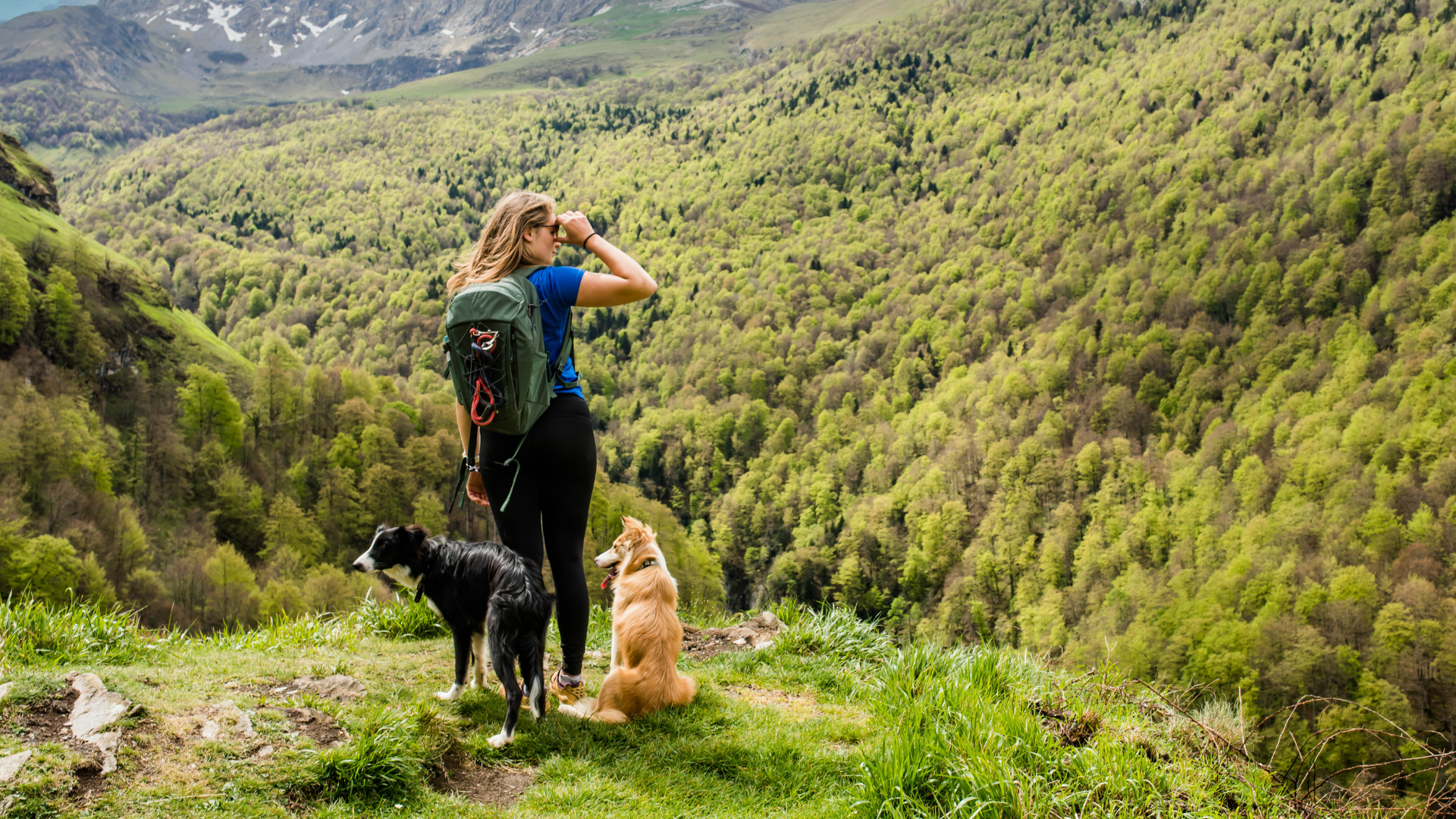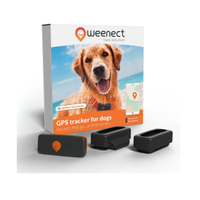Hiking with a dog: An expert shares her top tips
Everything you need to know about hiking with a dog.

Hiking with your dog can be an incredibly rewarding experience, offering a very special way to bond with them outside in the world. It not only enhances your bond but also provides both of you with much-needed exercise and mental stimulation. To get the most out of your adventures in the great outdoors together, it's essential to be well-prepared.
From choosing the right trail to packing essential gear like the best pet tracker, there are several important factors to consider before you and your dog start your hike. As a certified animal behaviorist specializing in dogs, I know how important it is to not only consider safety aspects of your walk – but also those related to the training and emotional wellbeing of your canine companion.
Whether you are a seasoned hiker or new to the experience, I’ve put together eight tips to help you get the most out of hiking with your dog by your side.
What you will need to hike with a dog
When heading out on your adventures with your dog - especially if you’re hiking with a dog - you’ll want to make sure you pack everything you may need. This includes items for both yourself and your dog to make sure you’ll be physically comfortable and safe throughout the walk.
Water
For both you and your dog. A collapsible bowl (like this one on Amazon) can also be useful to give your dog their drink more easily while not taking up too much space in your bag.
Food
If you’re planning on venturing out for a few hours, you might want to take a snack or light meal for yourself, as well as something for your dog. While you don’t want to feed your dog too much while they’re exercising, if you’re stopping for a picnic yourself then you might want to pack a small portion of your dog's food or the best long-lasting dog chew for them to enjoy. And don’t forget lots of the best dog treats to reward your dog for good recall and behavior.
First aid kit
Pack a kit that covers basic injuries or cuts for both you and your dog, including antiseptic wipes, bandages, and tweezers.
PetsRadar Newsletter
Get the best advice, tips and top tech for your beloved Pets
Poo bags
It’s important to leave your hiking location as you found it - that includes clearing up after your dog as well as taking your trash home. You might even want a poo bag holder that contains your full bags until you can find a trash can.
Leash
Even if you’re hiking in spaces where you can let your dog off the leash, it’s worth bringing both a leash and a long training line, in case you come across spaces where your dog either isn’t safe to be off-lead or there’s wildlife or livestock present.

ID tag
Make sure your dog’s ID tag/license tag is displayed at all times. This is especially important if you’re walking in new environments that your dog isn’t familiar with.
Towel
Heading out during a wetter part of the year? Take a towel to dry off both yourself and your dog if needed.
Tick Remover
Especially during the summer months, your dog might be prone to picking up ticks on their body. The sooner you can remove ticks from your dog, the better for their long-term health.
Appropriate Clothing
Weather can change throughout the day, so make sure you’re covered for all eventualities! It’s especially important to ensure you’ve got the right footwear for whatever terrain you and your dog are hiking in.
Contact list
If you’re not familiar with the area you’re walking in, look up a number of local vets in advance of traveling there. Keep a list of key contacts alongside your dog’s insurance and microchip numbers.
The Dog GPS Tracker – Weenect XS
This is one of the smallest trackers on the market. With no GPS range limit, you can track your dog’s movements in over 100 countries.
Preparation for hiking with a dog
If you love outdoor adventures, to the point that you even researched the best dogs for hiking, you’ll want to continue this sort of preparation before heading out for a hike.
- Visit your vet. It’s always worth scheduling a check-up with your vet to ensure your dog is in good health before any vacations or especially long hikes. They can help you to also assess your dog’s fitness to ensure they’re physically capable of handling the hike's distance and difficulty level.
- Research the trail. Check if the trail is dog-friendly; note any specific regulations, such as leash requirements; and work out where it might be possible to plan rest stops with your dog, to pause and hydrate. You might also want to research whether this route is more popular at certain times of the year - whether it might be too crowded and overwhelming for your dog.
- Check the weather. Make sure the weather is going to suit the hike you’re taking with your dog. Consider both your and your dog's ability to cope with heat, wet or cold.
- Do a trial hike. If either you or your dog isn’t used to hiking, try a gentle hike to see how you cope. You can then gradually increase your activity levels with shorter walks and hikes.

- Learn basic first aid. Familiarize yourself with basic first aid for dogs, including how to treat common injuries and identify signs of distress.
- Work on your dog’s recall. Ensure your dog is able to respond reliably to recall cues. If you’re struggling with recall, then practice walking your dog on a long training leash until you feel confident enough to let them off.
- Pack the essentials. Use our list above to pack up all the necessary items to keep you and your dog comfortable and safe on walks.
- Inform someone of your plans. Especially if you’re walking solo, make sure you inform a friend or family member of your hiking plans, including your route and expected return time.
- Start early. Begin your hike early in the day to avoid the peak heat and give yourself plenty of daylight to walk in.
Safety tips for hiking with a dog
When hiking with a dog, it is essential to take precautions to ensure both your safety and your dog's. Be vigilant about poisonous plants and assess the terrain under-foot. Be careful around any areas of water – especially if your dog loves to swim, you’ll want to watch out for fast currants or any debris they could get caught in. Check for ticks frequently and thoroughly inspect your dog post-hike.
To avoid heat stroke, hike during cooler parts of the day, carry plenty of water, and take frequent breaks in the shade. To prevent overexertion, gradually build up your dog's stamina and watch for signs of fatigue.
If walking in more remote areas, share your location with a friend or family member. Keep a watchful eye out for any potential dangers, including from wildlife.
By taking these precautions, you can enjoy a safe and enjoyable hiking experience with your canine companion.
Etiquette for hiking with a dog
When hiking with a dog, it’s important to ensure that any other hikers can also have a good time on the trail. Proper etiquette is crucial to ensure a pleasant experience for everyone.
Always pick up your dog's poop, disposing of it appropriately to keep the environment clean and safe for other hikers and wildlife. Adhere to all regulations, such as leash laws and designated dog-friendly trails.
These rules are in place to protect both your dog and the natural habitat you’re lucky enough to enjoy. Ensure your dog has good recall – this means they can come back to you as soon as you ask, so you can avoid them disturbing any wildlife, approaching other hikers or their dogs, or venturing into dangerous areas.
If you’re wondering when is it too hot to walk your dog, we can help you to make an informed decision. We’ve also got a list of the best dog walks in the US to inspire your hiking adventures.

Caroline Wilkinson is a Certified Animal Behaviorist. She is a Full (assessed) Member of the APDT and INTODogs – as well as a Registered Training Instructor (ABTC). Caroline is also a Certified Real Dog Yoga Practitioner and an Applied Canine Zoopharmacognosist.

